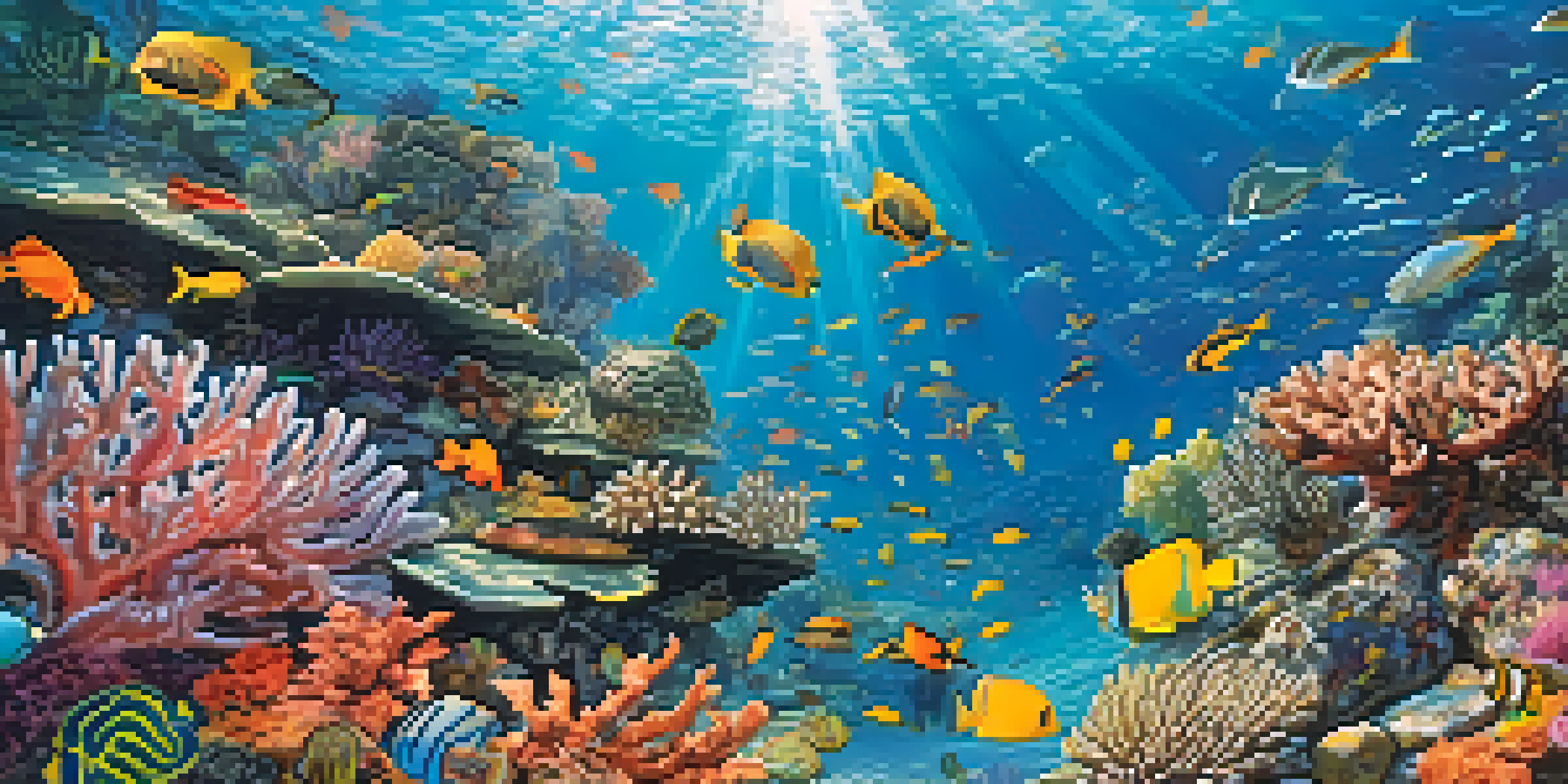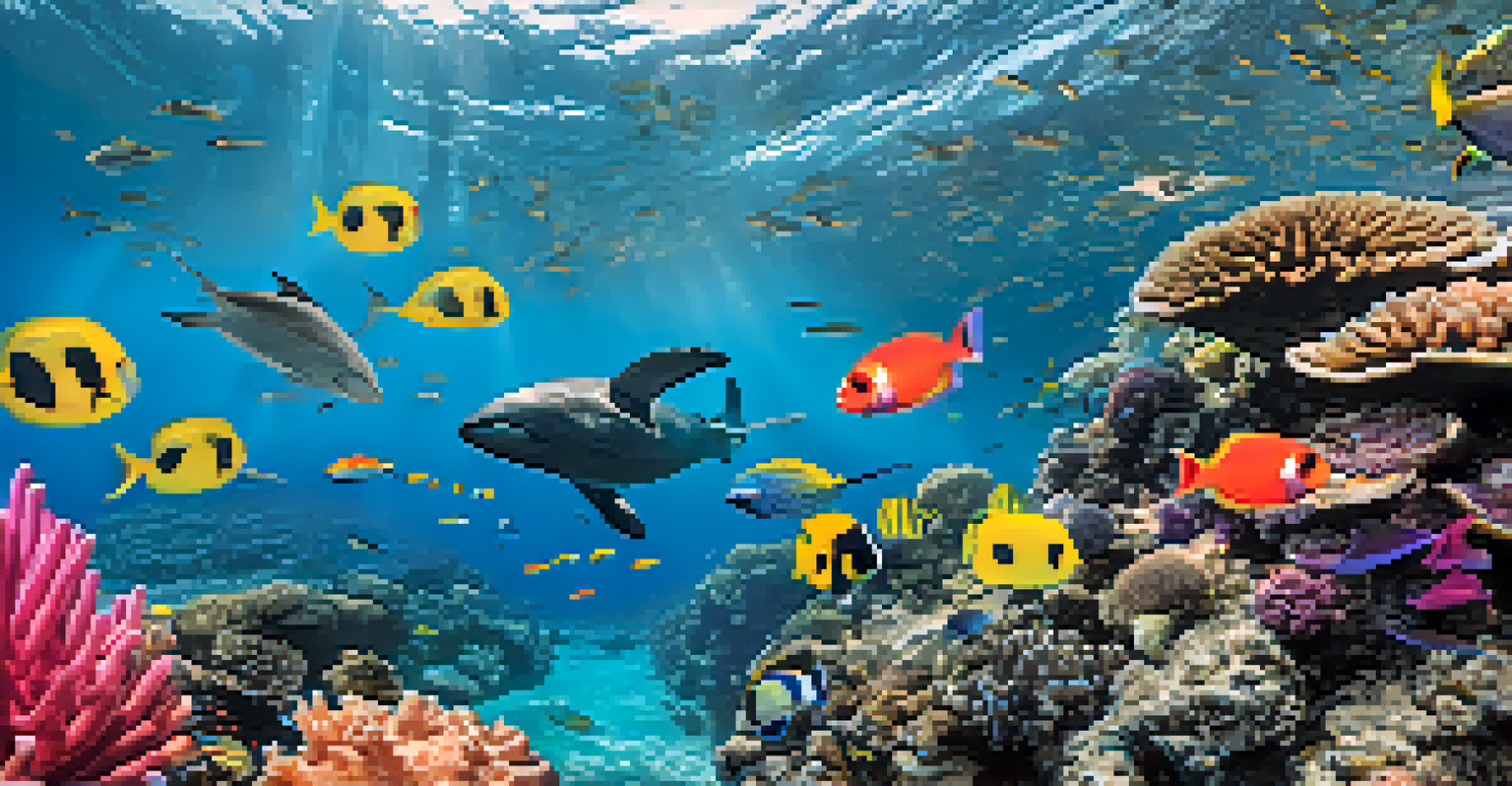Educating the Public on Ocean Conservation in Honolulu

The Importance of Ocean Conservation in Honolulu
Honolulu, with its stunning beaches and vibrant marine life, is a hub of biodiversity. However, this natural beauty is threatened by pollution, climate change, and overfishing. Educating the public about these issues is crucial for preserving the ocean's health. By understanding the importance of ocean conservation, residents can become advocates for sustainable practices in their community.
The ocean is a central part of our lives and our well-being. Protecting it is an investment in our future.
The ocean plays a vital role in regulating our climate and providing resources. It supports countless species and contributes to the local economy through tourism and fishing. However, many people are unaware of the struggles our oceans face. This lack of knowledge can lead to apathy, making education an essential tool for change.
Engaging the public in ocean conservation efforts can foster a sense of stewardship. When people recognize the value of their natural surroundings, they are more likely to take action. This can range from participating in beach cleanups to supporting local policies that protect marine ecosystems.
Community Programs for Ocean Education
Community programs are an effective way to educate residents about ocean conservation. Organizations in Honolulu, like the Waikiki Aquarium, offer workshops and outreach programs that focus on marine life and ecosystem health. These hands-on experiences can make learning about the ocean both fun and impactful.

Educational programs often include interactive activities, such as guided beach walks and snorkeling trips. These experiences help participants connect with the ocean in a personal way, fostering a deeper appreciation for marine life. When individuals witness the beauty of coral reefs and marine animals firsthand, they are more likely to advocate for their protection.
Community Education Drives Action
Engaging programs in Honolulu empower residents to take an active role in ocean conservation through hands-on experiences and collaboration.
Moreover, collaboration with local schools can enhance ocean education. By integrating marine science into the curriculum, students can learn about the importance of conservation from a young age. This early exposure lays the groundwork for a future generation that values and protects their ocean environment.
Utilizing Social Media for Outreach
Social media platforms provide a powerful tool for spreading awareness about ocean conservation. Organizations can share captivating images, videos, and stories that highlight the beauty of Hawaii's marine environment. This not only educates followers but also inspires them to get involved in conservation efforts.
We won’t have a society if we destroy the environment.
Engaging content, such as live Q&A sessions with marine biologists, can foster a sense of community online. When people feel connected to experts, they are more likely to ask questions and participate in discussions about ocean health. This two-way communication can also help dispel myths and raise awareness about pressing issues.
Additionally, social media campaigns can mobilize support for local initiatives. By encouraging followers to take specific actions, such as signing petitions or joining clean-up events, organizations can create a ripple effect. Each share or post has the potential to reach new audiences, amplifying the message of ocean conservation.
The Role of Local Businesses in Conservation
Local businesses play a significant role in promoting ocean conservation in Honolulu. By adopting sustainable practices, they can reduce their environmental footprint and inspire customers to do the same. For example, restaurants that use sustainably sourced seafood contribute to healthier ocean ecosystems.
Moreover, businesses can partner with conservation organizations to host events and workshops. These collaborations not only boost community engagement but also educate consumers about the impact of their choices. When businesses take the lead in sustainability, it sets a positive example for others.
Social Media Amplifies Awareness
Utilizing social media platforms helps spread awareness about ocean conservation and encourages community involvement in local initiatives.
Incentives, such as discounts for customers who participate in conservation activities, can further encourage community involvement. By rewarding eco-friendly behavior, businesses can foster a culture of sustainability. This collective effort can lead to significant positive change for the ocean.
Creating Engaging Educational Materials
Educational materials are essential for raising awareness about ocean conservation. Infographics, brochures, and videos can simplify complex information and make it accessible to a wider audience. By using visuals and relatable language, organizations can effectively convey the urgency of ocean protection.
Additionally, incorporating local stories and cultural perspectives can enhance the relevance of educational content. When people see how ocean issues directly affect their community, they are more likely to take action. This connection can be made stronger through storytelling, showcasing personal experiences with the ocean.
Moreover, interactive tools like quizzes and games can engage audiences in a fun way. These resources not only educate but also empower individuals to make informed decisions about their impact on the ocean. By making learning enjoyable, organizations can inspire a lifelong commitment to conservation.
The Impact of Volunteer Opportunities
Volunteer opportunities provide hands-on experiences that deepen understanding of ocean conservation. Programs like beach cleanups and marine monitoring allow participants to see the direct impact of their efforts. This tangible connection can inspire a passion for protecting marine environments.
Volunteering also fosters a sense of community among participants. Working alongside others who share similar values can create lasting friendships and networks. These connections can lead to ongoing collaboration on conservation initiatives, amplifying the impact of individual efforts.
Local Businesses Lead by Example
Sustainable practices by local businesses not only reduce environmental impact but also inspire customers to engage in conservation efforts.
Furthermore, volunteers often become advocates for ocean conservation in their personal lives. By sharing their experiences on social media or within their communities, they can raise awareness and inspire others to get involved. This grassroots movement can create a ripple effect, leading to greater community engagement in conservation.
The Future of Ocean Conservation in Honolulu
The future of ocean conservation in Honolulu depends on continued education and engagement. As awareness grows, so does the potential for community involvement in protecting marine ecosystems. By fostering a culture of stewardship, we can ensure that future generations inherit a healthy ocean.
Innovative technologies, such as apps that track marine health, can enhance conservation efforts. These tools can provide real-time data, helping communities make informed decisions about their local environments. When equipped with the right resources, residents can actively participate in monitoring and improving ocean health.

Ultimately, collaboration among residents, businesses, and organizations will be key to successful conservation efforts. By working together, we can create a more sustainable future for our oceans. The path forward is bright, as long as we remain committed to education and action in the face of pressing challenges.